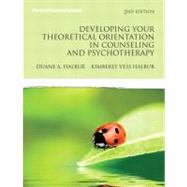Developing Your Theoretical Orientation in Counseling and Psychotherapy provides therapists-in-training with tools, strategies, and activities to formulate their response to the age-old question, "What's your theoretical orientation?" The underpinnings of counseling and psychotherapy are based in its theoretical foundation. This text gives students the understanding and the tools to develop a theoretical orientation throughout their training program.
The innovative Second Edition incorporates cultural competencies and alternatives views of theoretical orientation, such as strategic eclecticism, as well as provides a greater focus on constructivist and family theories.
New to This Edition
-NEW! A primer of major family theories to provide students with a great summary for those who have already had theories, or as reminder for those later in their development as counselors (Ch. 4).
-NEW! Clinical examples help makes the process of finding a theory pragmatic (Ch. 5).
-NEW! Case studies for supervisors working with those with unique theoretical orientations (Ch. 5).
-NEW! Provides a rational for theoretical orientation and compares this to eclectic and empirically validated therapies, offering strong support for the foundation of having a theory of counseling (Chs. 1 & 2).
"I like the simplistic stance this book uses to guide and facilitate what all counselors find hard to do...that is, to develop their theoretical orientation. Whether novice or amateur, this book offers the helping professional a step-by-step process to articulate this process." -Joy J. Burnham, University of Alabama
"I see the basic strength of the book being the opportunity and structure it provides students to examine the philosophical and personal factors that might influence their choice of a theoretical approach." -James Archer, Jr., University of Florida
"The text offers a clear and concise guide for students to assist them in moving toward actively utilizing theory in their practice" -Valerie G. Balog, Univesity of North Carolina at Charlotte
"I think this is a good supplemental text to the comprehensive overview of theories types that are currently available. I also think there is a market for this as a supplemental text in a clinical course (practicum, for example)." -Heather Trepal, University of Texas at San Antonio








